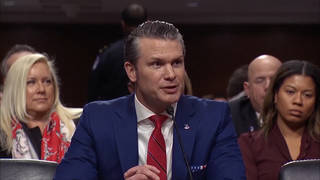
Topics
By Amy Goodman with Denis Moynihan
Manuel Zelaya, the democratically elected president of Honduras, is back in his country after being deposed in a military coup June 28. Zelaya appeared there unexpectedly Monday morning, announcing his presence in Tegucigalpa, the capital, from within the Brazilian Embassy, where he has taken refuge. Hondurans immediately began flocking to the embassy to show their support. Zelaya’s bold move occurs during a critical week, with world leaders gathering for the annual United Nations General Assembly, followed by the G-20 meeting of leaders and finance ministers in Pittsburgh. The Obama administration may be forced, finally, to join world opinion in decisively opposing the coup.
How Zelaya got into Honduras is still unclear. He told the press Monday, “I had to travel for 15 hours, sometimes walking, other times marching in different areas in the middle of the night.” One source inside the Brazilian Embassy said he may have hidden in the trunk of a car, successfully bypassing up to 20 police checkpoints.
Around dawn Tuesday, supporters who defied the government-imposed curfew outside the Brazilian Embassy were violently dispersed with tear gas and water cannons. Electricity, phone and water service to the embassy have been shut down, and the Honduran military has reportedly set up a truck with loudspeakers there, blasting the Honduran national anthem. On Monday, the Organization of American States (OAS) reiterated its call “for the immediate signing of the San Jose Agreement,” the accord negotiated by Costa Rican President Oscar Arias calling for Zelaya’s return as president, with members of the coup regime included in the government, and amnesty for anyone involved in the coup. Zelaya has agreed to the terms, but installed coup President Roberto Micheletti has rejected them.
After the June 28 coup, the OAS immediately suspended Honduras from OAS proceedings and called for Zelaya’s immediate reinstatement. On June 30, the U.N. General Assembly issued a unanimous demand for “the immediate and unconditional restoration of power” for Zelaya.
Likewise, UNASUR, the Union of South American Nations, at its summit in Quito, Ecuador, formally denounced the coup. The OAS Inter-American Commission on Human Rights traveled to Honduras in late August and reported that demonstrations in support of Zelaya “were broken up by public security forces, both police and military, resulting in deaths, cases of torture and mistreatment, hundreds of injured, and thousands of arbitrary detentions.”
President Barack Obama, on June 29, said clearly, “We believe that the coup was not legal and that President Zelaya remains the president of Honduras, the democratically elected president there.” But subsequent action, or inaction, by Obama and Secretary of State Hillary Clinton has sent mixed signals. While Obama originally used the word coup, official policy pronouncements have avoided the term, which, if used, would trigger mandatory suspension of foreign aid. Instead, the Obama administration has deployed selective punishment of the coup regime, rescinding visas for Micheletti and other key coup figures, and halting a relatively token $30 million in aid.
Clinton said Monday, at a meeting with Costa Rica’s Arias: “We just want to see this matter resolved peacefully, with an understanding that there will be the remainder of President Zelaya’s term to be respected.” The United Nations will most likely take action this week in support of Zelaya. Zelaya said Tuesday from the Brazilian Embassy: “The U.S. should respond and respect the OAS charter. The United States should call for an emergency meeting of the United Nations Security Council. The United States should take every type of trade sanction measure in order to pressure this regime now in power in Honduras.”
Obama is expected to chair a session of the U.N. Security Council, marking the first time a U.S. president has done so. Costa Rica currently has a seat on the Security Council, and could in theory bring up the issue of Honduras. Then in Pittsburgh, where the G-20 is meeting to assess and act on the global financial crisis, Brazil’s support for Zelaya may be a factor. Brazil, a G-20 member, is by far the largest economy in South America, and is a key ally and trading partner of the U.S. With tear gas wafting through the Brazilian Embassy in Tegucigalpa, and a potential armed assault on it by the coup regime to arrest Zelaya, this week may force Obama and Clinton to finally help the people of Honduras undo the coup.
Amy Goodman is the host of “Democracy Now!,” an independent, daily global TV/radio news hour airing on more than 950 stations in the United States and around the world. She is the author of “Breaking the Sound Barrier,” recently released in paperback and now a New York Times best-seller.
© 2011 Amy Goodman











Media Options